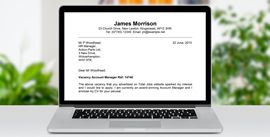Why Must Your CV and Cover Letter Work Together Like a Good Double Act?

Share this article by clicking on the buttons below:
In this article on CVs and cover letters you'll:
- Find out why your CV and cover letter must work together in tandem.
- Learn what happens when either your CV or cover letter is letting you down.
- Discover how to make both your CV and cover letter work in harmony and win you the interviews you desire.
Enter stage right your CV and cover letter
- In the entertainment world for a double act to work you need two great performers, if one is poor, then their act just won't work.
- Your cover letter and CV form a similar double act, they need to work in tandem, a great cover letter with a poor CV or a poor cover letter with a great CV will cause a major disconnect for an employer / recruiter.
- They will immediately start to doubt that you are the ideal candidate that can meet all the requirements of the job.
- As soon as any doubt is raised in the mind of the employer, you've almost certainly lost them, if you were in the room with them, you could reassure them, but you're not! All they have is your CV and cover letter.
- If they aren't consistent, then it's almost a certainty that they'll reject your application, meaning no job interview for you.
How can a poor cover letter let you down?
- Having a poor cover letter can do irreparable damage to your chances of getting an interview.
- Some people worry that their cover letter will steal the thunder from their CV, so when somebody reads the CV after their great cover letter, they'll have nothing left that's different to say in their CV.
- But, if you don't whet the employer's interest in your cover letter, why should they even bother with your CV?
- This is especially important if you're emailing your CV to a very busy employer or recruitment consultant; with so many competing demands on their time, they're just as likely to move onto their next email as to open your CV.
- So always make sure that you give them some really good reasons to actually open your CV in your email cover letter.
How can a poor or inconsistent CV let you down?
- If you have a great cover letter, then this will grab an employer's attention, making them want to meet you and encouraging them to want to read your CV.
- But, imagine their total and utter disappointment if they then read your CV and instantly discover that it's poor or very weak.
- All the good work that your cover letter has done will be immediately undone by your CV.
- The complete disconnect between the cover letter and the CV will almost certainly result in your candidacy being rejected.
- At Bradley CVs, we've seen this time and time again, when a seemingly great candidate submits a good cover letter, but with a CV that is a complete let down and doesn't match the requirements of the job.
- You also need consistency between the cover letter and CV, if you've steered the cover letter one way to make your experience relevant for the job, then your CV doesn't back this up, you'll just lose the employer / recruiter.
- You need both your CV and cover working closely together to persuade an employer that they should interview you rather than the other candidates.
How can you ensure that both your CV and cover letter work in harmony and win you the interviews you desire?
Here's Bradley CVs top 10 tips to make your CV and cover letter work together:
- Your cover letter must highlights the relevant skills, experience and achievements on your CV that match what an employer / recruiter is looking for - study the job advert, job description and person specification.
- You must show consistency between your CV and cover letter, if you've steered the cover letter to make your experience seem relevant to a specific job, then you must tweak your CV so that it backs this up.
- Sometimes you may even need to rewrite your CV (or sections of it) to more closely match the job you're applying for - if your CV doesn't seem to match the job, than an employer will just reject you (even if you could do the job).
- When you're highlighting something in your cover letter that's from a while ago, you should also identify your job title / employer's name, so when someone reads your CV they can look out for this too.
- If you're applying for jobs with widely differing job titles, then you'll need a different CV and a different cover letter for each one, otherwise you'll risk your CV / cover letter not meeting the criterion of any job.
- Even if you're applying for jobs with the same job title and sector, there will always be some differences in what the job involves, so don't send exactly the same CV and cover letter, tailor them to specifically fit each job.
- When you're seeking a complete career change, you must focus your CV and cover letter on your potential, outlining your relevant transferable skills, experience, achievements, qualifications and training.
- If you're seeking a promotion, then you must show in both your CV and cover letter that you are ready to step up a level by demonstrating you have the experience and skills (and perhaps training / qualifications too).
- Once you've got your CV and cover letter ready, reread them both through several times and check for consistency with any job advert and continue tweaking them until they work together as a whole.
- Always remember that your CV and cover letter need to work in tandem and form the perfect double act, this will make an employer want to interview you ahead of all the other applicants.
Share this article
If you'd like to share this article, then please click on the buttons below:
Other Pages You May Wish to Visit
Do you still need a cover letter?






